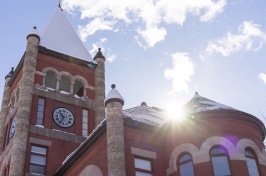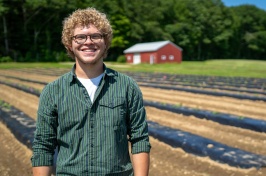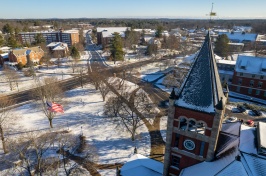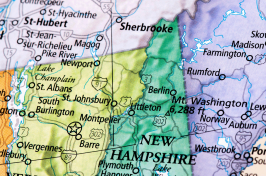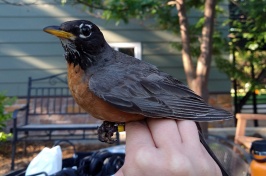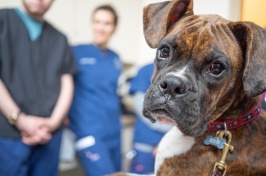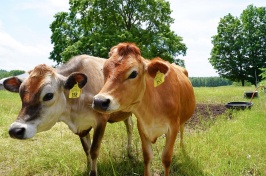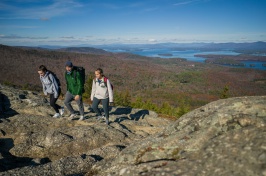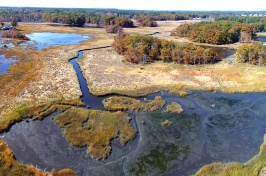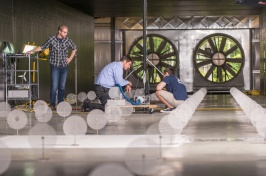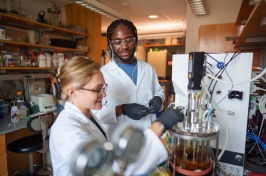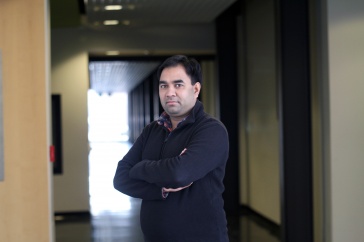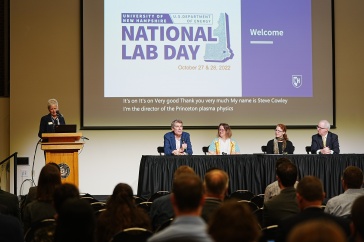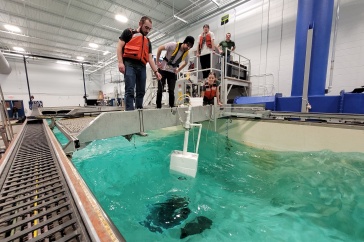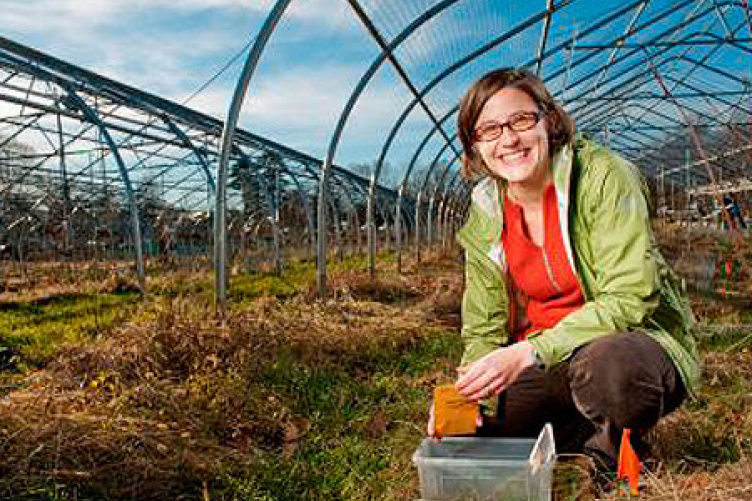
Vikki Rodgers studying how plants respond to climate change at the Boston Area Climate Experiment in Waltham, MA. (Photo credit: Webb Chapel).
As an undergraduate studying biology at UNH, Vikki Rodgers ’99 had a rare glimpse into her own future. “I was taking Vegetative Sampling and Analysis with professor Tom Lee, going out in College Woods once a week, and absolutely loving it,” says Rodgers. “I saw how happy professor Lee was, and I thought that maybe I, too, could get a job that would pay me for teaching while being out in nature.”
Rodgers has been living her dream, teaching various environmental science courses at Babson College in Mass. since 2007. She recently won the Dean’s Award for Teaching Excellence, due in part to her innovative use of technology and frequent small group activities to engage students. “I design questions to pop up during lecture and students respond with clickers,” she says. “It gives me immediate feedback.”
In addition, Rodgers streams educational video clips on the Blackboard site for pre-class work, has her students use automated probes to take measurements in the lab, and encourages them to create their own multi-media presentations to gain important skills for a variety of future careers.
“Initially I had no idea that I’d be so happy at a business school,” says Rodgers. “I kept my mind completely open about where I might fit best, and now I get to inspire these students who really need to understand science, ecology, and sustainability as they go on into business.” Furthermore, Rodgers brings her students out into nature to – as she says – “dig through the mud” at the Boston Area Climate Experiment in Waltham, Mass. Here, scientists and students alike study how plants are responding to climate change among 36 different plots, each two meters by two meters.
“It looks like the skeleton of a green house,” says Rodgers who collaborates with Jeffrey Dukes of Purdue University, the principal investigator on this research project, funded by the National Science Foundation and the U.S. Department of Energy. Rodgers recently completed an experiment measuring photosynthesis and transpiration rates of plants experiencing artificially induced climate changes at the Waltham site. “We study what happens when we heat up the plots and cause drought,” says Rodgers. “We’ve introduced twelve different climates, incrementally increasing temperature and changing moisture patterns.”
Even though Rodgers graduated with a degree in biology, she began taking environmental science courses in the College of Life Sciences and Agriculture at UNH during her sophomore year. “Professors Tom Lee and James Taylor taught general ecology and they were an amazing team,” says Rodgers. “Professor Lee came from the plant side and professor Taylor, the animal side. It was a hard course. Completely fascinating. And we had outdoor labs.”
Rodgers designed her honors thesis project under the direction of professor of natural resources and the environment Barry Rock, collecting red pine needles from the Mount Moosilauke area and assessing the levels of damage associated with ground-level ozone pollution, based on EPA measurements from that time.
“I looked at spectral reflectance – the color of the needles – and physical damage by slicing and staining needles in the lab and examining the cells,” says Rodgers. “I was following up on a ten-year experiment that professor Rock had started with his graduate students. Even though the sampling size was not large enough for publication, there was a trend. The better ozone conditions resulted in healthier needles.”
Rodgers credits her undergraduate experiences at UNH for providing her with a well-rounded education that included minors in environmental conservation and Spanish. “It was the breadth of courses and research opportunities at UNH that helped keep me open to future possibilities and therefore helped me to obtain a teaching position at a business school,” says Rodgers who obtained a Ph.D. in forest ecology and biogeochemistry at Boston University in 2007.
No stranger to the academic lifestyle, UNH was like a second home to Rodgers whose father, Frank Rodgers, recently retired from teaching microbiology at COLSA. It wasn’t until she secured an undergraduate teaching position in the general biology and general ecology labs that Rodgers, herself, got a taste of helping others to learn.
“Then I taught a plant biology lab in graduate school and I was hooked,” says Rodgers. “I love being able to get students excited to learn new things.”
Originally published by:
COLSA Insight, Newsletter for the College of Life Sciences and Agriculture
-
Written By:
Staff writer | Communications and Public Affairs











